
You’re likely a fan of peanuts. Who isn’t? They’re crunchy, tasty, and generally considered healthy.
But, some surprising findings from the University of Liverpool might give cancer patients a reason to reconsider their peanut intake. Here’s the scoop in plain language.
Peanuts and a Sneaky Protein
Have you ever heard of Peanut agglutinin (PNA)? It’s a protein found in peanuts that gets into your bloodstream when you eat them.
The researchers found that this PNA protein interacts with cells in your blood vessels to create things called cytokines.
Cytokines: The Bad Guys
Why are cytokines a problem? Well, these particular ones – IL-6 and MCP-1 – are known to help cancer spread.
They make the cells in your blood vessels more attractive to cancer cells, increasing the chances of cancer spreading in the body.
Sticky Situation
A previous study by the same team showed that PNA from peanuts binds to a sugar chain found mainly on cancer and pre-cancerous cells.
This binding triggers changes in the cancer cells that expose adhesion molecules on their surface, making them stickier. It’s like the PNA is providing velcro for cancer cells to latch onto blood vessels.
These sticky cells can form clumps, increasing their survival in the body’s circulation. And guess what? Many cancers spread to other organs by traveling through the bloodstream.
What Does This Mean for Peanut Lovers?
Does this mean you should stop eating peanuts altogether? Not necessarily. The researchers point out that normal peanut consumption is unlikely to cause harm.
But, for cancer patients, eating a lot of peanuts very frequently might increase the risk of cancer spreading. If you’re a cancer patient who loves peanuts, it might be a good idea to limit how often you eat them.
More Research Needed
The scientists note that they need to do more research to understand how heavy peanut consumption might impact cancer patients’ survival.
So, while this isn’t the final word on peanuts and cancer, it’s important information for cancer patients to consider.
The study was conducted by Lu-Gang Yu and his team, and it was published in the journal Carcinogenesis.
In the world of health and wellness, knowledge is power, so keep an eye out for new studies that help you make the best decisions for your health!
If you care about cancer, please read studies about dry shampoo and cancer risk, and vitamin D supplements strongly reduce cancer death.
For more information about health, please see recent studies about how drinking milk affects the risks of heart disease and cancer and results showing higher intake of dairy foods linked to higher prostate cancer risk.
Follow us on Twitter for more articles about this topic.
Copyright © 2023 Knowridge Science Report. All rights reserved.



